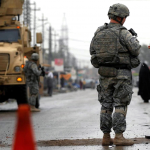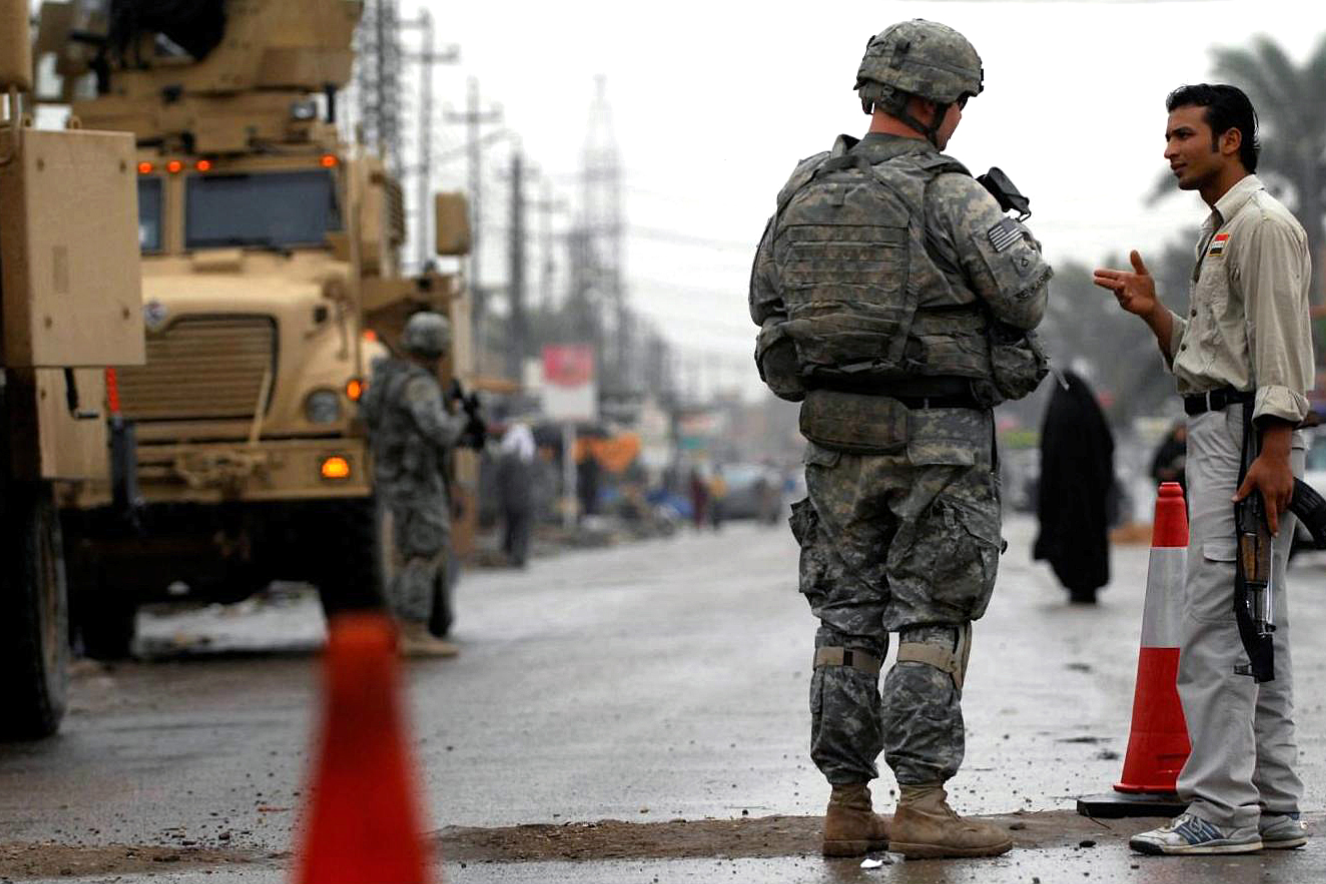The loss of Dabiq was a huge propaganda blow for ISIS. The fight for Mosul continues.
Mosul
» For ongoing updates, the Intelligencer recommends research published by the Institute for the Study of War (ISW) at understandingwar.org.
O
n October 17, Iraqi Security Forces (ISF) launched operations to capture Mosul, the largest city still under ISIS control.1 Early in 2014, jihadists seized the city of over 1.5 million people and declared a caliphate encompassing large swaths of Iraqi and Syrian territory. Now, a force of over 30,000 Kurdish and Iraqi Peshmerga forces and Sunni tribal fighters are engaging in building-to-building combat in Mosul itself, supported by US airstrikes.
The first day of the operation, in October helicopters released flares and Kurdish soldiers began to capture outlying villages to the east of Mosul.2 Since then, ISF has breached the city boundary and taken several neighborhoods. The movement toward the city center, ISIS’ stronghold, is slow, hampered by IEDs, snipers, and suicide attacks.7 Four thousand to eight thousand ISIS soldiers are thought to still occupy the city, meaning that victory will not come easily for thecoalition attacking Mosul.
Syrian Democratic Forces (SDF) the have begun attacking Raqqa as well, another ISIS stronghold. Along with depriving ISIS of a key city, the attacks are meant to divert the group’s attention and strength from Mosul.7
While ISIS leaders understand that the Mosul battle is one they will eventually lose, they aim to protract the fight to make it costly to the attackers. The group has had many months to prepare for the attack, which is evident in their strategy of attrition. The strategy of long defeat was also used in Ramadi and Fallujah.3 Following Mosul’s eventual capture, ISIS forces in the region have already begun to revert to old guerilla tactics by utilizing car bombs, suicide attacks, and assassination attempts to divide their enemies.1, 7
The assault on Mosul raises the serious question of long-term stability in light of the various involved powers’ different motivations and interests. Every major faction fighting ISIS has its own particular goals (the Kurds desire independence; nearby Syrians desire a Sunni enclave; the Turkish government wants stability and a weakening of the Kurds, etc.).3,4 Unless there is continued cooperation, the collapse of ISIS through the capture of Mosul could be worse than ISIS itself: Sunni versus Shi’ite, Arab versus Kurd, and Iran, Turkey, other Arab states, and Russia all could compete to serve their own ends. In the words of strategy expert Dr. Anthony Cordesman, “The most critical aspect of the battle may not be whether ISIS is defeated. It may be whether Iraq’s deeply divided factions can find some way to cooperate if they win.”3 As a result, the West is treading carefully in its attempt to deal a knockout blow to ISIS; it must put an end to the terrorist group while simultaneously preventing the eruption of yet another conflict. ■
Dabiq
Even as the massive campaign for Mosul commenced, an operation of even greater ideological significance concluded with the recapture of Dabiq by anti-ISIS forces. Dabiq is a small town in northwestern Syria, 10 kilometers from the Turkish border, and despite its size the locale has long held incredible narrative importance for ISIS fighters.1 End-times prophecies and the fulfillment of those prophecies have formed an integral part of the terrorist group’s appeal for years, and the capture of Dabiq in 2014 was heralded by terrorist leaders as a great victory, the fulfillment of the most emphasized ISIS foretelling.5 According to years of speeches and proclamations, there would be a major battle fought against the infidels at Dabiq that ISIS would win, and that would lead to the eventual capture of Constantinople by terrorist forces and the end of the world; this was the reason why “Dabiq” was (until recently) the title of ISIS’ English-language publication.5 However, on October 16, a quick offensive by 2,000 Syrian rebels from different military groups launched an attack, supported by Turkish forces on the ground and US forces in the air. Despite ISIS rhetoric that the battle would be hard fought, the fighting was over in less than 24 hours, with rebel forces meeting minimal resistance as ISIS retreated to al-Bab in the southeast.5
To be sure, the forces currently occupying Dabiq are not as ideologically pro-Western as America would like. The Syrian forces involved in Dabiq’s capture operated as the Free Syria Army, rivals to the Kurdish-majority Syrian Democratic Forces (backed heavily by the United States). Reported participant groups in the Free Syria Army include the Levant Front and Nour a-Deen al-Zinki, both of which are regularly described as Islamist, in favor of Sharia law, and likely proxies for the Islamist government of Turkey.5
Nevertheless, the terrorists’ loss of Dabiq last week is of incredible value for the anti-ISIS movement. Even before the battle, as if in anticipation of loss, ISIS relaunched its Dabiq magazine as Rumiyah (Rome).5 This sends a dour signal that will likely have a divisive effect on ISIS followers.6 A great deal of confidence lay in the town’s place in End-Times prophecy and in defeating the West through combat, and the results of the Dabiq clash paint the picture of a weak ISIS capable only of retreat. According to homeland security expert Dr. Ryan Mauro, “The loss of Dabiq is a defeat so resounding that even the master propagandists of ISIS cannot effectively spin it.”5 In the end, while the town’s capture was not geographically or militarily significant, its strategic importance to Western counter-terrorism efforts is invaluable. ■
- Alexandra Gutowski, “ISIS Sanctuary Map: October 17, 2016,” Institute for the Study of War, 17 October 2016,
http://understandingwar.org/backgrounder/isis-sanctuary-map-october-17-2016 - Babak Dehghanpisheh and Ahmed Rasheed, “Iraq Launches Mosul Offensive to Drive out Islamic State,” Reuters, 17 October 2016, http://www.reuters.com/article/us-iraq-mosul-idUSKBN12G0Z1.
- Anthony Cordesman, “Will ‘Winning’ in Mosul be ‘Losing’?” Center for Strategic and International Studies, 17 October 2016, https://www.csis.org/analysis/will-winning-mosul-be-losing.
- Emily Anagnostos “Iraq Situation Report: October 12-17, 2016,” Institute for the Study of War, 17 October 2016, http://understandingwar.org/backgrounder/iraq-situation-report-october-12-17-2016.
- Ryan Mauro, “ISIS’ Big Defeat: The Loss of Dabiq,” The Clarion Project, 18 October 2016, http://www.clarionproject.org/analysis/isis’-big-defeat-loss-dabiq.
- Nick Robins-Early, “ISIS Loses the Syrian Town Key to Its Belief in the Apocalypse,” The Huffington Post, 18 October 2016, .
- Emily Anagnostos, “The Campaign for Mosul: November 4-7, 2016,” Institute for the Study of War, 7 November 2016, http://understandingwar.org/backgrounder/campaign-mosul-november-4-7-2016.
Image credit: Map originally at NYTimes.com.




